#hazbin analysis
Explore tagged Tumblr posts
Text
I haven’t seen anyone talk about Alastor’s cannibalism in relation to his relationship with Vox
So with most cannibalistic serial killers the reason they are people wasn’t because they liked the taste. It’s about full control and psycho-sexual desire as consumption.
The want of control is obvious all though Alastor’s character over himself and others. From the way he clearly gets joy out of ordering Husk around and literally owning his soul to his own ever-present smile (if we assume he’s not forsed into it as has not yet been confirmed) as a means of controlling his own character at all times. But with cannibalism it’s more than that, it’s control over your victim ever after they died, the power to not only control their souls but their body
And that’s where the psycho-sexual part of it comes in. In resent years movies like “raw” and “bones and all” we see what has always been a part of cannibalism: desire. Because it’s not only the power, it’s also the feeling of consumption, of becoming one with your victim. I’m a way, that’s not too different from sex in it’s most pure and carnal. In real killers most of the cases of cannibalism are sexual, with sex crimes accompanying. We can assume Alastor wasn’t like that, but the element or the carnal desire that plays such a big part in cannibalism still follows his character.
All of that to say that the desire that Alastor can feel in his own twisted way towards other demons is��� impossible with Vox. He’s not made of flesh and bone (most probably) and we don’t know if he ever was. There is nothing for Alastor to feel attracted towards, not even his body (in the most literal way). We can also play with the idea that Vox is a sort of Ship of Theseus-type cyborg replacing parts of himself with machine one by one until there is none left as we do not know of any other demons in hell who are anywhere like him. So even if Alastor could feel that sort of way towards Vox, it is no more. And on the other side, if Vox was literally re-born as machine (maybe as ironic punishment for trying to be like one on earth like cutting off his emotions, etc) than that Alastor finds most desirable in a person was never there in Vox to begin with.
This parts a bit of stretch but even without the cannibalism Alastor thrives in watching people who are hopeful, souls who try and fail over and over again. Which maybe, as a machine, Vox originally wasn’t. Maybe at the start of their relationship he was calculating and unemotional which pairs well with Alastor’s own mask of detachment and indifference but also makes him completely uninteresting to Alastor as a subject of desire. But on the other hand Vox isn’t just machine, he’s a TV and his character reflects the media’s reactionary and emotional judgment. I just don’t know how Alastor ever worked with Vox if he’s always had the mindset we see in the show. But if that’s the case Alastor does feed on Vox’s desperation but never fully, never truly desiring him the consuming, power-play way that he feels most strongly (aka the want to eat him). I present you with both readings of Vox’s past emotional state as we do not as of now know what their relationship has been before
TLDR: Vox is the pinnacle of un-fuckable to Alastor, as even though he does not feel sexual desire the cannibalistic part of him can feel the psycho-sexual want to consume a body. Which he can’t with Vox who is machine.
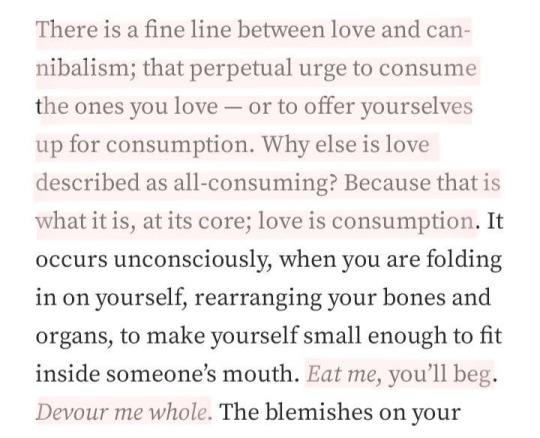

I’d love to hear what other have to say about a machine loving a cannibal so please feel free to share your readings in the tags
#a machine loving an asexual cannibal isn’t that an idea#I’ll give you everything but what you desire most I do not have#no matter what I do#he can take him apart and still have him functional probably but I don’t think he’s into that#radiostatic#hazbin hotel#hazbin vox#hazbin hotel vox#alastor#alastor hazbin hotel#hazbin analysis#hazbin theory#staticradio#alastor x vox#vox x alastor#alastor analysis
329 notes
·
View notes
Text
I realize we’re probably supposed to feel threatened, or at least worried, that the Vees are all ready for a power grab, but I’m…not.
Like, we just watched Carmilla and Rosie — aka the supplier of Angelic weapons and the apparent best information broker in Hell — clearly cement themselves as being on Charlie’s side. Alastor might have gotten his ass kicked by Adam, but he still held his own for a good while. Besides, Adam was clearly the strongest person in Hell at that point except for Lucifer, so it’s hardly a humiliating defeat. And considering the other Overlords already there are his friends, we can expect Zestial would probably jump in on the project just for kicks.
Compared to all them, the Vees…aren’t exactly a threat. They can’t do shit if Carmilla refuses to sell to them, and while she’s the least invested in the Hotel of all the Overlords involved, I do think she’d draw that line if she thought it necessary. Business is clearly a secondary priority compared to family for her, and I’m suspecting her daughters might end up being some of the Hotel residents since it’s a good place to stay safe.
And even without that, uh. Lucifer. Lucifer who just kicked Exterminator ass for all of Hell to watch, Lucifer who just demonstrated to the public how much he cares for his daughter and how brutal he would be to anyone that threatened her, Lucifer who is the literal king of Hell and will now be staying at the Hotel.
To throw Vox’s words back in his face: they’re gonna die. They’re gonna fucking die.
#hazbin hotel#hazbin spoilers#hazbin hotel spoilers#hazbin vox#hazbin velvette#hazbin valentino#hazbin theory#hazbin analysis#hazbin lucifer#hazbin alastor#hazbin rosie#hazbin carmilla#max.txt
2K notes
·
View notes
Text
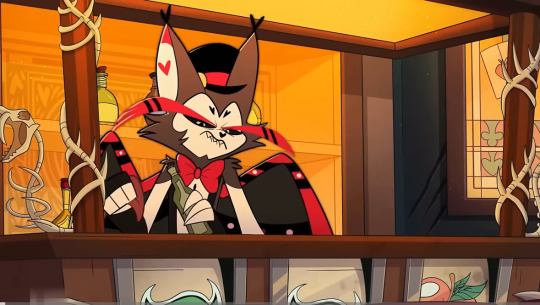
Why has Husk never stood up for himself, especially when uncomfortable over Angel's advances?
Well, what if it's because of the very deer who owns his soul.
(TW FOR SLIGHT SA/ABUSE REFERENCES, MENTIONS OF BEING DRUGGED) (ITS ANGEL DUST)
ALRIGHT YALL, BEAU IS BACK WITH ANOTHER ANALYSIS. I'm so excited to be writing a Husk-centric one, he's one of my favorite characters!

So, we all know Angel likes to flirt, and this is mostly because of the way he copes with his own situation. Husk makes it very prominent about his discomfort towards these gestures, as he's the main victim of Angel's fake flirting.
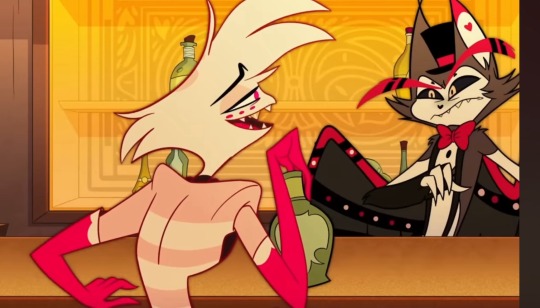
While he shows his discomfort, however, he never actually tells Angel to stop. All he does is push him away, weather that is an annoyed reaction or literally pushing him away. He never sets boundaries, or even says no to him.

This all changes when Charlie introduces the concept of boundaries to Husk, as she had crossed Angel's earlier with the Valentino situation. While Husk seems annoyed about her remark, he takes it to Husk.

When Husk talks to Angel after saving him from being drugged at a club, we notice him setting boundaries for the first time, saying that Angel is always "pushing [his] boundaries". He also uses the same language he learns from Charlie earlier with the boundaries talk.
But why does Husk never set boundaries before this? Because he can not.

Husk is on a leash, meaning he has to take every order from his boss, or he could lose his life. He can't say no.

And Alastor's treatment only reinforces how not only hopeless he is, but how powerless he is over his own life. He can not back away from Alastor's grasp, and it makes him feel like he has no choice on how others treat him, especially with Angel Dust.

I wonder who's situation this remind me of?
But it makes sense that one person struggling with boundary issues is the one to hurt someone else struggling with boundary issues.

But when Husk opens up about his boundaries, it makes both parties feel better. Husk feels more in control of his life, having the ability to say no. Angel dust feels in control of his life as well, having the respect to not have to essentially sell himself to feel respected, as boundaries are in place to respect all involved.
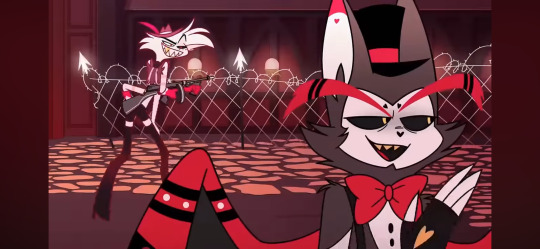
Because he is willing to open up about his boundaries, it actually makes Husk feel more comfortable around Angel Dust, as he knows Angel's remarks will only be that of light hearted rather than sexualizing (to an uncomfortable degree). This is why Angel and Husk are able to become so close; as the trust formed between them allows them to open up to each other. This is a healthy relationship. Romantic or not, HuskerDust has really gone a long way for the best!
#hazbin alastor#hazbin hotel#hazbin hotel alastor#hazbin theory#hazbin charlie#hazbin hotel charlie#hazbin husk#hazbin hotel husk#hazbin husker#hazbin hotel husker#hazbin angel dust#hazbin analysis#hazbin hotel angel dust#huskerdust#hazbin huskerdust#hazbin#bounderies
294 notes
·
View notes
Text
Understanding Husk
A "husk" means a shell or a protective outer cover. This fits his character well since he's shown to be a husk of a man. More specifically, he's a former overlord who lost his power.

Husk in the "Pilot" was a lot more grumpy than he is in the show proper, losing his temper at Alastor and not hesitating to show his disinterest in anything going on as long as it doesn't concern him. When he sees just who has yanked him away from his card game, all he can do is exasperatedly ask Alastor what he wants with him this time. Seeing as Alastor is a constant reminder of how his gambling ended up costing him his status as an Overlord, it's easy to understand why he'd be upset at having to bend to the Radio Demon's will.
In the series, it's established he's still a jerk, but it's evident he cares, and his temper isn't as volatile and often warranted. In the beginning, Husk made it no secret that he was forced to stay at the hotel because of his ties to Alastor and would gladly get as far away as he could if able to. Behind his grumpy exterior, Husk is actually very patient and it takes a lot to make him legitimately angry.
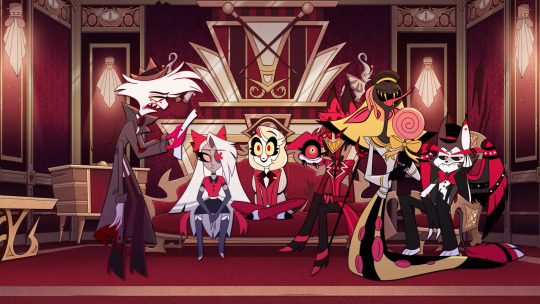
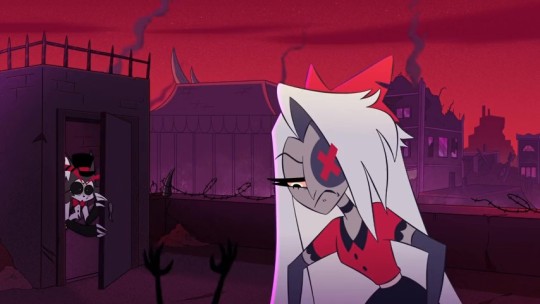
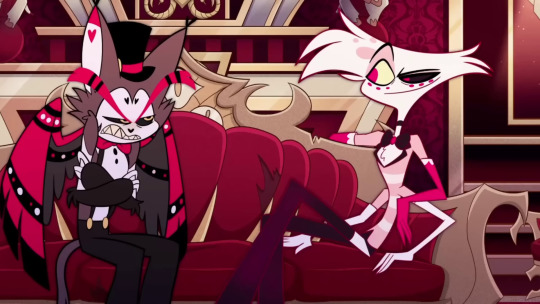
He does his job as a bartender competently, but Husk is fairly blunt about the fact he's only participating in the group's shenanigans because he simply can't be bothered to protest. He does join bonding activities but departs once it's no longer enjoyable for him, after Vaggie decided to literally throw everyone into the middle of a turf war as part of her trust exercises. Thankfully, he grows out of this a bit as the series goes on and grows to care about the staff and guests.
Husk has his own issues and is pretty much apathetic to almost everything out of pessimism. But he still has the most common sense out of the cast and he's the most emotionally intelligent and self-aware, even serving as an advisor to the others at the right times when he's not bitterly accepting his circumstances. The hotel's owner is the only cheerful idealist demon princess who just wants to see the good in everyone, one investor is a maniac who wants to get entertainment out of watching the chaos, the other investor is the owner's neglectful, depressed father (and also the literal King of Hell), the manager is bossy and threatens people with weapons at the slightest provocation, and the cleaning lady is a neatfreak with a thing for "bad boys". Then there's Husk wanting nothing to do with their escapades. He's also a lot more hostile towards Alastor and Angel after they touch him multiple times.

It should be noted that Alastor lets Husk get away with flipping him off. But the moment Husk brings up the fact that Alastor's own soul belongs to someone else within earshot of the Radio Demon, Alastor can barely restrain himself to threatening to tear Husk's soul apart and broadcast his screams for all to hear if he ever says that again. By the end of the encounter, Husk is a shivering, terrified wreck and Alastor couldn't care less.
As the bartender, Husk knows how to listen to people and knows exactly what kind of problems that all the residents of the hotel are going through, and while he would rather let them solve their own problems, he isn't exactly above giving them some pretty solid, if very brutally honest. While it was unnecessarily rude to bring up the Hotel residents' flaws, Husk was accurate about every one of them as Charlie's desperate to help others but doesn't confront her own issues, Vaggie judges others because she hates herself, Sir Pentious is a lonely Sinner who watches people in their sleep, and Angel puts on an act that he's happy about his porn star job but is really miserable.

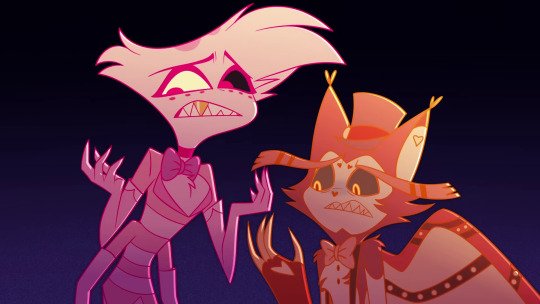
Husk was always cynical and crass, but he's also an old Sinner with a tender heart. With Angel however, he tends to be a lot more irritable. While it initially looks to be because of Angel constantly flirting with him, it's because he hates how hard Angel acts out to hide how miserable he actually is, considering him a "phony" in a self-destructive spiral. He eventually realizes he and Angel are the same, despite their differences. They're both self-destructive addicts since Husk is a gambling addict, while Angel is addicted to sex and drugs who sold their souls to an abusive Overlord. And both of them have descended even further into their addiction and adopted outwardly cynical, cruel personas as a coping mechanism.
Husk getting through to Angel Dust in the manner he does makes a considerable amount of sense when it's taken into account that the first step to overcoming drug addiction is usually getting the addict to acknowledge they even have a problem. Angel hasn't been able to get better despite having some genuine interest because he's been utterly refusing to admit he has a problem to fix, the moment he does his mood drastically improves as does his motivation.
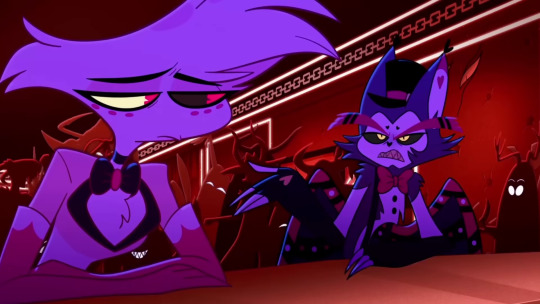
In "Welcome To Heaven", Husk saw Cherri as a bad influence on Angel's path of redemption and advised her not to get high during their night out. He even defends Angel from Cherri's criticism about how the hotel was changing him. Of course Husk wants what's best for Angel, but unlike Cherri who thinks that feeding into Angel's addictive tendencies are the best way to treat his depression and that living up to the hotel's standards is only making his life more difficult, Husk encourages Angel to stick with the self-improvement he's learned from the hotel and not fall back into his old ways since Angel's trying to get into Heaven.
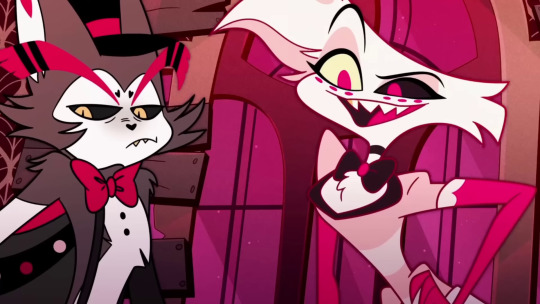
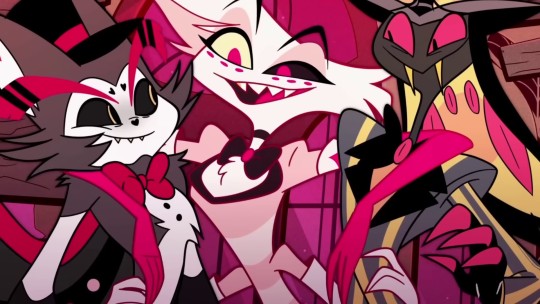
When Vaggie leaves to find out how angels can be killed, she tells Angel, Sir Pentious, Husk and Niffty that she knows they didn't sign up to be the first targets of the angels, so she wouldn't blame them if they left. Of course, when she and Charlie return, they find that all of them have stayed and fortified the hotel.
Husk even admitted that he doesn't want to look for new drinking buddies and being nice to both Angel and Pentious is a demonstration of the massive character development he's undergone over the course of the show. In the beginning, he was grouchy towards everyone and hated even being in the hotel, but now he's willing to risk his life to defend it and the other residents.
#hazbin hotel#vivziepop#hazbin analysis#character analysis#huskerdust#hazbin hotel angel#angel dust hazbin hotel#angel dust and husk#hazbin angel dust#husk#husk hazbin hotel#hazbin husk#hazbin hotel husk#husker#alastor the radio demon#radiohusk#huskdust#angelhusk#character writing#cherri bomb#cherri hazbin hotel#hazbin hotel charlie#hazbin alastor#alastor and husk#hazbin hotel niffty#niffty
545 notes
·
View notes
Text
Radiostatic thoughts.... radiostatic parallels..
Alastor always working to maintain the facade of a hunter, a predator, someone to be feared, when truly he is a prey animal, a deer
Vox always trying to convince the public to trust him... That he has the best of intentions in mind... When truly he's a shark, circling his prey
Alastor always working to keep his static filter up and to maintain his air of mystery and off-puttingness, his inhumanity, it slipping when he loses control and shows his voice unfiltered, normal and unthreatening
Vox always working to keep the static from his voice, to sound clear and open and trustworthy and human but it slipping into static when he loses control, monstrous, inhuman, deceitful
Alastor acting like he loves chaos but always needing to be in control
Vox acting like he loves being in control, but always needing to experience chaos
#hazbin hotel#hazbin vox#hazbin alastor#radiostatic#staticlovetune#staticradio#voxal#hazbin thoughts#hazbin analysis#theyre foils your honor
676 notes
·
View notes
Text
Something I was always a little concerned about in the lead-up to Hazbin Hotel was that Charlie was going to be a bit too passive of a character, ie; leaning only into the ‘kind, optimistic Disney-Princess-in-Hell who just wants to help everyone’ vibe and not really have much else going on as a character. Which in turn would make her feel kind of bland next to the big, over-the-top or dramatic personalities like Angel Dust and Alastor.
But thankfully, that is not what happened and there’s actually a lot that I like about what the writers are doing with Charlie, particularly in the potential future development and reveals they seem to be setting up.
First off, I like how Charlie generally comes off more like an over-the-top caricature of that ‘Disney-Princess-in-Hell’ vibe, ie; SUPER energized, enthusiastic, affectionate and emotional, often to overbearing degrees that get on everyone’s nerves. It’s generally funny, or at least amusing, and lets Charlie stand out alongside the other big personalities in the cast. Funny enough, she’s actually a lot like Blitzo in this regard, minus the seesawing into extreme abrasiveness.
And more importantly, we’ve already gotten major hints all but confirming that this over-the-top personality is largely a façade, and that Charlie actually has some very clear issues and baggage that she’s working VERY hard to keep buried beneath the surface. Again, much like Blitzo.
Like how in the trust-fall exercise in episode three, despite asking everyone to reveal something personal, Charlie actually bullshits just as hard as Angel Dust and Sir Pentious with her whole ‘I love you all!’ bit. Sure, it’s not like she was lying or being insincere, but it’s clear that was NOT something truly personal for Charlie. And in episode 4 we have Husk straight-up calls out Charlie as ‘wanting to solve everyone’s problems but her own’.
Then of course we have the brief glimpses we’ve seen of Charlie getting angry. Both the times we’ve seen Charlie dealing with some truly despicable and horrendous characters, we’ve seen that rather than lacking the ability to get angry, Charlie is often working to hold herself back. In both her encounters with Adam and Valentino we see points where Charlie is clearly NOT intimidated or afraid of them at all and seems fully prepared to throw down, only being stopped by reigning herself in or by someone else (in this case Angel) stopping her.
Again, it all paints Charlie’s big, bubbly, hyperactive exuberance as something of a front, a way for her to bury a lot of thoughts, feelings and general baggage she doesn’t want to face. Just like what the show has already explored with Angel and Husk.
It actually raises some interesting questions as to what’s REALLY driving Charlie in running the hotel and trying to help Sinners. For one, Husk has already pegged Charlie as ‘wanting to solve everyone’s problems but her own’. And going back to thematic crossover with Helluva Boss, I can’t help but see some potential parallels between Charlie creating the Hazbin Hotel, and Blitzo creating Immediate Murder Professionals.
I think it’s pretty clear at this point that half the reason for creating I.M.P. was as a coping mechanism for Blitzo, or rather the assassination business in general. Something that we’ve gotten hints to as early as the second episode in Blitzo’s back and forth with the Robo-Fizz (“Does anyone love you, Blitzo?”/“No. But I’m really good with guns now!”). With the other half of the reason Blitzo created I.M.P. clearly seems to be to create a surrogate family, as seen with how much he tries to insert himself in the M&M’s lives. Possibly even a specific attempt to replace the family he unwittingly destroyed fifteen years ago.
So I really have to wonder if we’re going to find out that Charlie creating the hotel and her goal of redeeming sinners is in part likewise a coping mechanism and escape for her own baggage.
It’s actually really interesting how episode two first introduced the idea of people opening up with Sir Pentious, then episode four dived further into the concept of the walls and fake personas people put up to hide from their pain and trauma with Angel Dust and Husk. With those two opening up and starting to let their walls down to each other, and by extension we the audience, I think it makes Charlie’s own façade all the more noticeable. It’ll be pretty interesting if Charlie actually winds up being the toughest nut to crack when it comes to opening up about their real issues and baggage. Yet another interesting trait she shares with Blitzo.
All in all, I’m really liking what the show has been doing with Charlie as a protagonist. And I’m REALLY interested to see where the story is going to take her.
Particularly what’s going to happen when she reaches a breaking point…
#hazbin hotel#helluva boss#hazbin analysis#hazbin theory#charlie morningstar#helluva blitzo#character parallels#character analysis#charlie has a LOT more going on than she's showing#blitzo hitting his breaking point had him crying himself to sleep into a pillow#what if charlie hitting HER breaking point has her raining LITERAL ARMAGEDDON down on some poor bastards?
856 notes
·
View notes
Text
Is Valentino being a moth a specific punishment? (cw sexual abuse, Valentino stuff)
(I shouldn't even have to say this but I've been on the internet long enough: obviously this isn't written to apologise any of Valentino's actions, pointing out evil people's suffering doesn't justify anything and is just for the fun of analysing)
I'm probably late to realise this but if the theory of some sinners getting a punishment (beyond being sent to Hell) is correct, Valentino's punishment is very likely his saliva/smoke being an addictive aphrodisiac. As far as we know, some sinner's physical forms are a mocking representation of what they were in their lives (e.g. Angel Dust's whole family being spiders) or a reference to how they died (Alastor turning into a deer) and since some moths have the ability to produce aphrodisiacs too, I would count that trait as part of Valentino's physical form. (We admittedly don't know much about other moth demons, Vaggie not being a canon moth demon anymore and all, though).
But hey, you might think, isn't his saliva something Valentino uses to his advantage? Isn't it exactly what he uses to control Angel Dust (and others)? How can that be a punishment?
Well, imagine him wanting a relationship with literally anyone. Valentino is entirely unable (whether he is unwilling or not isn't important here, both takes are very interesting) to have a close physical/romantic/sexual relationship with anyone because
1) whoever he kisses cannot consent in any meaningful way -> even if he cared about how people he sleeps with feel about doing so, he can't know for sure if they really want to or if he made them want it
2) while we don't know how much time/use it takes to become addicted to Valentino's aphrodisiac, we can safely assume that it will happen sooner or later (perhaps I'm interpreting the Poison song a bit too literally, sue me, but) -> if someone wants to spend time with him or be intimate with him he literally cannot know if it's because they like him or because they need another hit
3) other people who are affected by or addicted to his saliva (and with that, to intimacy with him) might not care if Valentino himself is willing to engage in anything with them -> Valentino's demonic traits put both him and others at a higher risk for sexual abuse
I can absolutely see his saliva being an initial punishment that he managed to use to his advantage. Depressingly, those features probably made him into the monster he is now.
Anyways that's it. Thank you for coming to my Ted talk. Please let me know your thoughts and theories. Please don't send me death threats for looking at a horrible character as a three dimensional being.
#hazbin hotel#hazbin analysis#hazbin hotel valentino#hazbin hotel angel dust#hazbin hotel staticmoth
62 notes
·
View notes
Text
Me watching Vox in stayed gone: well Vox, you seem to have some rejection sensitivity going on. Because this is a big time reaction to Alastor saying no to being your business partner. Which is also weird, seeing as he doesn’t really offer anything to your team being an old school, independent, radio host and serial killer.
I mean unless you guys can do some neat things with your powers together, I am not sure why you even asked. Unless it his charisma you were after, and the most charismatic you can get is a pleasant customer service voice, so I can see that.
Me after watching Vox in the final: OH! YOU WANT TO FUCK HIM SO BAD IT MAKES YOU LOOK STUPID!! And I am calling it now!! A big reason why he wants/wants to kill Alastor is because he can’t fucking have him!!
#hazbin hotel#hazbin alastor#hazbin vox#radiostatic#staticlovetune#hazbin analysis#alastor#hazbin hotel alastor#hazbin hotel vox
792 notes
·
View notes
Text
Why Alastor is good aroace rep after all, written by an aroace
Hello all! I just want to start off this post by saying that I'm one person who definitely doesn't speak for all aroaces, but I wanted to make a post on this anyway, and maybe some folk would be interested in hearing out another perspective?
I'm not really caught up on everything that's been said over the course of HH's creation - only more recent interviews, since I'm pretty new to the fandom. Apologies if I've missed anything, but also I do not have the time to keep up with all the out-of-canon-material backstory unfortunately. I'm working with what we've got here.
So here's the thing:
Alastor is cruel, he's narcissistic, he doesn't care about anyone except himself, he's a serial killer and a monster.
(That's the argument I've heard - please tell me if that's not really what people are going for lol, in which case I've totally misunderstood?)
The issue with aroace rep when it paints asexual people with those traits is that it aims to dehumanizes them. Sex and love are essential to the human experience, right? So why wouldn't someone be interested? Because they're self-absorbed, and cold, and detached. They don't have the capacity to love others enough to feel romance.
And sure, Alastor is a killer, and a schemer, and prideful, and a monster by hell's standards. But no matter how above it all and stylish and in control and provocative he wants to be, he's a very human character, and his aroace-ness never serves to add to his alienation. You could even say that it makes him seem even more personable.
That's what I think is the key difference.
why he's human
Alastor's whole persona is about control, and he basically straight-up says this. He's controlling what his enemies know, what his public image is like. His goal is to be the Radio Demon -- overlord of Hell, charismatic, Machiavellian, and undefeatable. He's not. Despite that smile plastered over his face (a powerful tool, huh) he's so expressive for someone who's constantly pretending.
You see his exasperation with the Egg Bois and with Charlie's ranting; his nervousness in front of Zestial; his frustration with Lucifer and the petty lengths he goes to to piss off the ruler of Hell.
You see his desperation, making that deal with Charlie. He's surprised by the idea of being vulnerable in front of an enemy like Adam, and so close to danger. He drops the radio filter and the affect out of fear, and runs on broadcast TV to let out panic and anger and bitterness in his hideout, where no one else can see him.
He has a smile that tells us he's genuinely happy to see someone; it's a little wider than his default. You see it with Mimzy's greeting, you see it with Rosie. Rosie, especially, serves to make Alastor more human to the audience. More on this later, but for now, I'm just saying that you can see that he at least seems to respect her greatly. Whatever bond they have, we know that he trusts her to touch him, to share history with him, and with support that he trusts no one else for.
He pretends, but he can't pretend it all away. Loads of these emotions aren't even advantageous for him to show. It isn't necessarily how the typical asexual psychopath acts; he's not emotionless or only capable of anger or brutality.
He's so full of emotion that it leaks through, despite all that he does to avoid it. He's not inhuman and aloof, not really - he's so, so human, even when he tries not to be because he thinks that'll be what keeps him above all the rest. In control, and free from his chains.
(If anyone wants to see images about all this, I'll make a separate post - just let me know.)
(I also have another post, talking about why Alastor is at least a little attached to the hotel's residents too, shown via conversation with Niffty. In what way? different question.)
how the aroace part contributes to that
Now, to be fair, we don't hear much about his aroaceness in canon. It's just not relevant a lot of the time.
In the pilot, Angel's proposition ruffles his feathers so much that Alastor blanks for a moment. It's a joke, sure, but that ace panic face is a pretty popular Alastor moment in the fandom - Alastor, thrown off-balance by a sex joke of all things, after so many years in Hell that he should probably be used to this.
It's a moment that makes him more approachable; his aroaceness shows him unprepared for something someone else does for one of the only real moments in the whole episode.
And the other part: the ace in the hole statement.
Rosie apparently knows Alastor so well that she read that he's aroace. That tells us about their relationship; namely, that it is long-standing and genuine enough that she gleaned a piece of real information from him. It's a casual fact that she knows about him before he even figured it out himself. It lends legitimacy to their bond - this bond that shows us a more comfortable and warm side of Alastor that we don't often see.
If their relationship is purely business, isn't this something pretty frivolous and personal? It's not like he has anything to gain by telling her about his life, but she learned about it somehow. How close are they? That's where it adds a layer of complexity and personality to his character..
thoughts on representation
Overall, Alastor's an interesting character who has a level of depth and care and personality (outside of cruelty) that asexual psychopath tropes lack. Again, the moments where he's being represented as disinterested in sex or romance don't make him seem detached. Again, they don't say "look how hostile toward relationships his behaviour is - how separate he is from our humanity". That's what bad villain ace rep is. That's not what the show's doing.
Also: I'm not saying that we need to lower our standards or anything, but even if you think it's not the best rep, I feel like we should be supporting HH's efforts here. I know that on Tumblr we have a pretty queer-friendly space going, which is honestly an understatement lol but
Aces are incredibly underrepresented in fiction. There's a whole Wikipedia page about asexual characters in media, and it's short as all hell, and even if you consider what's on there you see quite a number of one-off characters who are never mentioned again.
In terms of real life business - before the DSM updated their definition of hypoactive sexual desire disorder (HSDD) in 2013, identifying as asexual wasn't even a recognized thing. If you talked to a clinician about your lack of sexual desire, you could be diagnosed with a disorder. Only in the 5th edition do we now have a little exclusion footnote about it.
The concept of asexuality hasn't been explored nearly as much as other queer identities in our scientific research. We get crumbs in terms of mainstream representation and understanding. House M.D. has an episode where House "disproves" us because he's just so smart.
Alastor isn't going to be perfect representation. There's no such thing as perfect representation, and from the moment he was conceptualized, you could see how people would take him poorly. Still, I think he's a net positive.
He isn't a side character or a token ace - he's a core part of the show, whose personality and character motivations we can reasonably presume are going to be explored much more deeply in upcoming season(s). He's loved by the fandom. Right now, given what we know, I trust Vivziepop to write the aroace representation he deserves, because with the way I've heard the cast/directing/etc. talk about him, they're trying to do the aroace community justice, so I wish people would let up just a little on the whole "Alastor is bad rep".
Let's give him a chance, all right?
#hazbin hotel#aroace alastor#alastor analysis#hazbin alastor#hazbin hotel spoilers#asexual#asexuality#hazbin alastor meta#hazbin hotel alastor#hazbin#alastor#hazbin meta#hazbin analysis
397 notes
·
View notes
Text
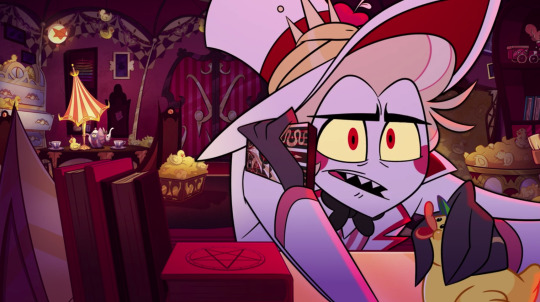
Is it just me, or does something seem very... autistic about this man?
Maybe it's the way he hyperfixates on ducks, or how he tends to keep to himself, or maybe it's how his social awkwardness/anxiety consumes him every waking moment, but there's something about the way he acts and interacts with others that just screams neurodivergence.
What say y'all?
#lucifer morningstar#hazbin hotel#hazbin#actually autistic#autism#neurodivergent#hazbin lucifer#hazbin hotel lucifer#lucifer hazbin hotel#vivziepop#vivzieverse#hazbin analysis#hazbin theory#neurodiversity#hazbin season 1#hazbin spoilers#hazbin hotel spoilers
239 notes
·
View notes
Text
You know, with Lucifer being the Sin of Pride, I kinda expected him to be…harsher? More arrogant? Solemn? Certainly, I wasn’t expecting a rubber-duck collecting, jazz singing, cat-loving enthusiastic goober. It feels like “proud” and “self-important” have gotten their wires crossed in my brain.
Because I’m realizing now that stuff like cooing over a cat, pet goats, etc., using embarrassing nicknames, hearing people take a dig at your less-than-commanding appearance, and having your familial drama, all the while not caring how many people have a front row seat to watch it happen….
That kinda is pride, isn’t it? Not to act the way everyone else thinks is proper or expects of you, but to do the exact opposite and not care what people think. Lucifer severely outclasses all of Hell, but especially sinners — why would he value their opinions? He may regret that he got cast out of Heaven just for humanity to abuse their free will, but the rest of his life and personality he’s seemingly pretty comfortable with.
The opposite of pride is SHAME. Of course Lucifer is shameless about being immature or weird or cringy!
#an inspiration to us all#lucifer morningstar#hazbin lucifer#hazbin analysis#hazbin hotel#hazbin spoilers#hazbin hotel spoilers#max.txt
2K notes
·
View notes
Text
Paradise Lost: How John Milton's 1667 work influenced "Hazbin Hotel"
I've been thinking about why the "fruit of knowledge" in Hazbin Hotel is depicted as an apple, as opposed to another fruit that would've been more accurate to the Middle East during the Fall of Man, as well as how Paradise Lost by John Milton (1667) influenced the show.
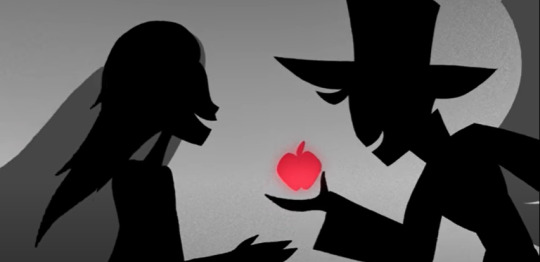
Per one source:
"Because the Hebrew Bible describes the forbidden fruit only as 'peri', the term for general fruit, no one knows [what exactly type of fruit it was]. It could be a fruit that doesn't exist anymore. Historians have speculated it may have been any one of these fruits: pomegranate, mango, fig, grapes, etrog or citron, carob, pear, quince, or mushroom."
Per Wikipedia:
"The pseudepigraphic Book of Enoch describes the tree of knowledge: 'It was like a species of the Tamarind tree, bearing fruit which resembled grapes extremely fine; and its fragrance extended to a considerable distance. I exclaimed, How beautiful is this tree, and how delightful is its appearance!' (1 Enoch 31:4)."
In Jewish and Islamic traditions, the "fruit of knowledge" is commonly identified with grapes. The Zohar explains that Noah attempted (but failed) to rectify the sin of Adam by using grape wine for holy purposes. Today, the "Noah grape" is still used to make white wine.

Furthermore:
"The association of the pomegranate with knowledge of the underworld as provided in the Ancient Greek legend of Hades and Persephone may also have given rise to an association with knowledge of the 'otherworld', tying-in with knowledge that is forbidden to mortals. It is also believed Hades offered Persephone a pomegranate to force her to stay with him in the underworld for 6 months of the year. Hades is the Greek god of the underworld, and the Bible states that whoever eats the forbidden fruit shall die."
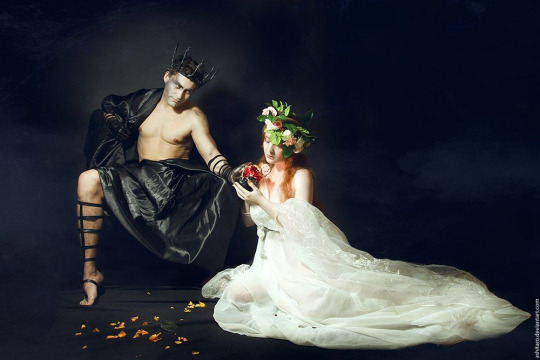
So, how then did the apple become the foremost symbol of the "fruit of knowledge"? You can partly thank Paradise Lost by English poet John Milton, a work which the lore of Hazbin Hotel is based off of.
Milton published the book in 1667, a time when the hedonistic Restoration era was in full swing. The exiled King Charles II was restored to the throne as King of England in 1660, and was a party animal, with dozens of mistresses, and nicknamed both the "playboy prince" and "Old Rowley", the latter after his favorite lustful stallion.
However, the association of the "fruit of knowledge" began with a Latin pun long before Milton immortalized the association in Paradise Lost. Per the linked article above by Nina Martyris for NPR:
"In order to explain, we have to go all the way back to the fourth century A.D., when Pope Damasus ordered his leading scholar of scripture, Jerome, to translate the Hebrew Bible into Latin. Jerome's path-breaking, 15-year project, which resulted in the canonical 'Vulgate', used the Latin spoken by the common man. As it turned out, the Latin words for evil and apple are the same: 'malus'.
[...] When Jerome was translating the 'Tree of the Knowledge of Good and Evil', the word 'malus' snaked in. A brilliant but controversial theologian, Jerome was known for his hot temper, but he obviously also had a rather cool sense of humor.
'Jerome had several options,' says Robert Appelbaum, a professor of English literature at Sweden's Uppsala University. 'But he hit upon the idea of translating 'peri' as 'malus', which in Latin has two very different meanings. As an adjective, 'malus' means 'bad' or 'evil'. As a noun it seems to mean an apple, in our own sense of the word, coming from the very common tree now known officially as the 'Malus pumila'. So Jerome came up with a very good pun.'
The story doesn't end there. 'To complicate things even more,' says Appelbaum, 'the word 'malus' in Jerome's time, and for a long time after, could refer to any fleshy seed-bearing fruit. A pear was a kind of 'malus'. So was the fig, the peach, and so forth.'
Which explains why Michelangelo's Sistine Chapel fresco features a serpent coiled around a fig tree. But the apple began to dominate Fall artworks in Europe after the German artist Albrecht Dürer's famous 1504 engraving depicted the First Couple counterpoised beside an apple tree. It became a template for future artists such as Lucas Cranach the Elder, whose luminous Adam and Eve painting is hung with apples that glow like rubies.
Milton, then, was only following cultural tradition. But he was a renowned Cambridge intellectual fluent in Latin, Greek and Hebrew, who served as secretary for foreign tongues to Oliver Cromwell during the Commonwealth. If anyone was aware of the 'malus' pun, it would be him, and yet he chose to run it with it. Why?
Appelbaum says that Milton's use of the term 'apple' was ambiguous. 'Even in Milton's time the word had two meanings: either what was our common apple, or, again, any fleshy seed-bearing fruit. Milton probably had in mind an ambiguously named object with a variety of connotations as well as denotations, most but not all of them associating the idea of the apple with a kind of innocence, though also with a kind of intoxication, since hard apple cider was a common English drink.'
It was only later readers of Milton, says Appelbaum, who thought of 'apple' as 'apple', and not any seed-bearing fruit. For them, the forbidden fruit became synonymous with the 'malus pumila'. As a widely read canonical work, 'Paradise Lost' was influential in cementing the role of apple in the Fall of Man story."
To tie this back into John Milton's relationship with King Charles II of England, as mentioned, Milton originally served Oliver Cromwell, Lord Protector of England, and the English Commonwealth, which was formed with the overthrow and execution of King Charles I on 30 January 1649, following the bloody English Civil War (1642 – 1651).
The King's two sons - the newly-christened King Charles II, the elder, and James, Duke of York (King James II), the younger - fled into exile on the European continent. However, with the death of Oliver Cromwell on 3 September 1658 came the 2-year-long dissolution of the English Commonwealth, and the restoration of the monarchy.
As for Milton himself, we can look to an article by Bill Potter.
Milton, born on 9 December 1608, was around 51-52 years old when King Charles II was restored to the throne. He attended Christ's Church, Cambridge in his youth, and mastered at least six languages, as well as history and philosophy; making him, perhaps, the most knowledgeable poet in history. He spent more than a year travelling across Europe, conversing with and learning from intellectuals, linguists, poets, and artists, including the famous Galileo Galilei.
However, Milton was a controversial figure of his time, being unafraid to criticize institutions of authority; arguing that "divorce was Biblical", for which he was routinely condemned; joining the Puritans; penning the Areopagitica, a treatise on liberty in favor of Parliament and the Roundhead rebels, during the reign of King Charles I, arguing that the King must be held accountable by the people; and agreed with and justified the murder of King Charles I, for which Parliament hired him in 1649 as a propagandist and correspondence secretary to foreign powers, on account of his fiery manifestos against "the man".
The collapse of the Commonwealth with the death of Oliver Cromwell in 1658 did not deter Milton from continued political writing against the monarchy and the new public sentiment that brought about its Restoration under King Charles II in 1660. On the contrary, Milton - now totally blind, having lost his eyesight by the age of 44 in 1652, a decade earlier - began writing Paradise Lost in 1661, and spent the next six years dictating the work to transcribers.
A supporter of regicide, Milton was also forced into exile himself, and faked his own death, as Charles refused to pardon - and sought to execute - any of those directly involved with his father's murder. Milton's friends held a mock funeral for Milton on 27 August 1660, just months after the coronation of King Charles II on 23 April 1660.
King Charles II commented that he "applauded his [Milton's] policy in escaping the punishment of death [execution for treason] by a reasonable show of dying", but insisted on a public spectacle nonetheless by having Milton's writings burned by the public hangman.
After eventually obtaining a general pardon from King Charles II, Milton was imprisoned, and released, likely due to political friends in high places. He died, aged 64, in 1674. His theological views were sometimes considered heterodox by the best Puritans, and his political views came close to getting him executed on several occasions. His poetry, however, has endured as some of the greatest works in the English language, especially Paradise Lost; much of his greatest work was written during his 22 years of complete blindness.
One of the main factors in King Charles II deciding to grant a pardon to Milton was, ironically, Paradise Lost. While originally written by Milton as a scathing criticism of King Charles II and the monarchy - depicting Lucifer Morningstar as a sympathetic rebel against God, with King Charles II claiming that is right to rule came from "divine ordainment" - Charles II enjoyed the work, and authorized its publication on 20 August 1667. We know this because a 1668 copy of Paradise Lost in royal bindings by Samuel Mearne, bound lovingly in a fine red leather made of goat skins tanned with sumac, and stamped in gold with the royal cypher of King Charles II, was found. The endpapers bore a watermark with the royal arms of Charles II.
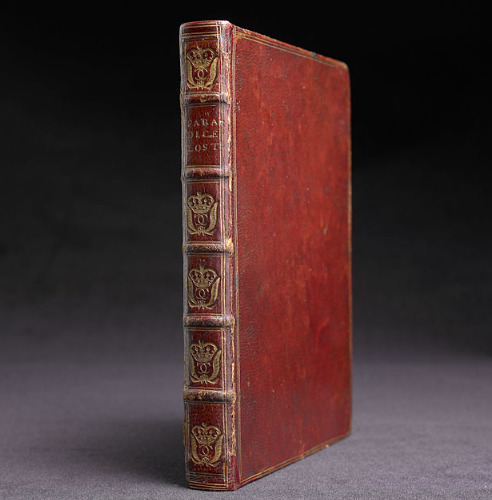
Per one Miltonian scholar: "The most single important event in Milton's life was the event against which he struggled most: the Restoration of Charles II, [and his relationship with the King]. Had it not come, we might have never had Paradise Lost...certainly, we should never have had [it] in [its] present power and significance."
Milton followed up Paradise Lost with Paradise Regained in 1671, three years before his death, with advice for King Charles II, urging the hedonistic Charles to "reign over himself and his passions":
"For therein stands the office of a King, His Honour, Vertue, Merit and chief Praise, That for the Publick all this weight he bears. Yet he who reigns within himself, and rules Passions, Desires, and Fears, is more a King; Which every wise and vertuous man attains: And who attains not, ill aspires to rule Cities of men, or head-strong Multitudes, Subject himself to Anarchy within, Or lawless passions in him which he serves." - John Milton, Paradise Regained, Book II, lines 463-472
To summarize: "If we must have a King back again, my Lord, please try to be a good man, unlike your father, who fell to his pride, [which was also the downfall of Lucifer]."
To quote another source: "Though the passage begins by noting that the office of a King is to bear the weight of public concerns, it is the control of one's private concerns that truly set a King apart as a virtuous character. Indeed, so important is self-command that any wise or virtuous man who attains it is like a king; any king who does not practice [self-command] is nothing more than a mere subject, ruled by anarchy and lawlessness."
Milton's words, too, echo a work written by Charles' grandfather, King James VI/I of Scotland and England: Basilikon Doron ("Royal Gift").
Per Wikipedia:
"'Basilikon Doron' (Βασιλικὸν Δῶρον) means 'royal gift' in Ancient Greek, and was written in the form of a private letter to James' eldest son, Henry, Duke of Rothesay (1594–1612). After Henry's death, James gave it to his second son, Charles, born 1600, later King Charles I. Seven copies were printed in Edinburgh in 1599, and it was republished in London in 1603, when it sold in the thousands.
This document is separated into three books, serving as general guidelines to follow to be an efficient monarch. The first describes a king's duty towards God as a Christian. The second focuses on the roles and responsibilities in office. The third concerns proper behaviour in daily life.
As the first part is concerned with being a good Christian, James instructed his son to love and respect God as well as to fear Him. Furthermore, it is essential to carefully study the Scripture (the Bible) and especially specific books in both the Old and New Testaments. Lastly, he must pray often and always be thankful for what God has given him.
In the second book, James encouraged his son to be a good king, as opposed to a tyrant, by establishing and executing laws as well as governing with justice and equality, such as by boosting the economy. The final portion of the Basilikon Doron focuses on the daily life of a monarch.
All of these guidelines composed an underlying code of conduct to be followed by all monarchs and heads of state to rule and govern efficiently. James assembled these directions as a result of his own experience and upbringing. He, therefore, offered the 'Basilikon Doron' ('Royal Gift') to his son, with the hope of rendering him a capable ruler, and perhaps to pass it down to future generations.
Overall, it repeats the argument for the divine right of kings, as set out in 'The True Law of Free Monarchies', which was also written by James. It warns against 'Papists' (Roman Catholics) and derides Puritans, in keeping with his philosophy of following a 'middle path', which is also reflected in the preface to the 1611 King James Bible. It also advocates removing the Apocrypha from the Bible."
King James VI/I further instructed his son and grandson:
"A good monarch must be well acquainted with his subjects, and so it would be wise to visit each of the kingdoms every three years."
"During war or armed conflict, he should choose old-but-good captains to lead an army of young and agile soldiers."
"In the court and the household, [a royal] should carefully select loyal gentlemen and servants to surround him. When the time came to choose a wife, it would be best if she were of the same religion and had a generous estate. However, she must not meddle with governmental politics, but perform her domestic duties."
"As for inheritance, to ensure stability, the kingdom should be left to the eldest son, not divided among all children."
"Lastly, it is most important...that [a royal] would know well his own craft...to properly govern over his subjects. To do so, [one] must study the laws of the kingdom, and actively participate in the council. Furthermore, [one] must be acquainted with mathematics for military purposes, and world history for foreign policy."
"[A royal] must also not drink and sleep excessively. His wardrobe should always be clean and proper, and he must never let his hair and nails grow long. In his writing and speech, he should use honest and plain language."
King James VI/I further supplemented Basilikon Doron with a written treatise titled The True Law of Free Monarchies: Or, The Reciprocal and Mutual Duty Between a Free King and His Natural Subjects.
"It is believed King James VI/I wrote the tract to set forth his idea of absolutist monarchism in clear contrast to the contractarian views espoused by, among others, James' tutor George Buchanan (in 'De Jure Regni apud Scotos'), [which] held the idea that monarchs rule in accordance of some sort of social contract with their people. James saw the divine right of kings as an extension of the apostolic succession, as both not being subjected by humanly laws."
Milton's own Areopagitica was a follow-up on De Jure Regni apid Scotos by George Buchanan, and also to The True Law of Free Monarchies, as well as the idea of the "divine right of kings". It takes its title in part from Areopagitikos (Greek: Ἀρεοπαγιτικός), a speech written by Athenian orator Isocrates in the 4th century BC.
Most importantly, Milton also wrote on the concept of free will: "Milton's ideas were ahead of his time in the sense that he anticipated the arguments of later advocates of freedom of the press by relating the concept of free will, and choice to individual expression and right."
The concept of free will, too, was a major topic explored in Paradise Lost. Per one source: "In 'Paradise Lost', Milton argues that though God foresaw the Fall of Man, he still didn't influence Adam and Eve's free will. [...] God specifically says that he gives his creatures the option to serve or disobey, as he wants obedience that is freely given [or chosen], not forced. Some critics have claimed that the God of the poem undercuts his own arguments; however, Milton did not believe in the Calvinistic idea of 'predestination' (that God has already decided who is going to Hell and who to Heaven), but he often comes close to describing a Calvinistic God. God purposefully lets Lucifer (Satan) escape Hell, and sneak past Uriel into the Garden of Eden, and basically orchestrates the whole situation so that humanity can be easily ruined by a single disobedient act. In describing the Fall of Man before it happens, God already predicts how he will remedy it, and give greater glory to himself by sending his Son [Jesus Christ] to die, and restore the order of Heaven."
In Hazbin Hotel, Adam also describes the Calvinistic idea of 'predestination', and that "the rules are black and white":

However, "This possible predestination leads to the theory of the 'fortunate fall', which is based on Adam's delight at learning of the eventual coming of the Messiah [from his bloodline]. This idea says that God allowed the Fall of Man, so that he could bring good out of it, possibly more good than would have occurred without the Fall, and be able to show his love and power through the incarnation of his Son. In this way, the free will of Adam and Eve (and Lucifer/Satan) remains basically free, but still fits into God's overarching plan."
However, there is one major flaw with this, and that is that we don't know if Jesus Christ exists within the Hazbin Hotel universe or not. Yet Charlie Morningstar, the daughter of Lucifer Morningstar and Lilith, and the "Princess of Hell", is depicted as a savior-esque figure within the show who, like God in Paradise Lost, encourages lowly sinners to choose obedience to God out of their own free will. More interestingly, Charlie does not come from Adam's bloodline; yet, while Lucifer decries 'free will', Charlie supports 'free will' instead.
Perhaps is is merely because Charlie, being the daughter of Lucifer and Lilith, claims to want to fulfill Lilith's "dream" of humanity being empowered in Hell ("The mind is its own place, it can make Heaven out of Hell, or Hell out of Heaven" - Lucifer, Paradise Lost); however, I think it also stems from Charlie having a genuine belief that 'free will', and people choosing to do good instead of evil, is "good" and "Godly".
True to Paradise Lost, this is also in fulfillment of God's plan; and, according to one fanfiction, why God allowed Charlie to be born to Lucifer and Lilith, so that sinners may be redeemed through Charlie.
For more on differing interpretations of 'free will', I suggest reading: "Free Will and the Diminishing Importance of God's Will: A Study of Paradise Lost and Supernatural" by Kimberly Batchelor (2016)
Excerpt: "'Paradise Lost' –and Milton’s purpose for writing the poem— is rooted deeply in postreformation Arminianism and this is apparent in its employment of free will. Chapter 1 argues that Milton turns to free will as a tool to justify the actions of God. Freedom of choice is God-given, and sets up a morality in which right and wrong are dictated by God. Chapter 2 shows that in 'Supernatural', free will is not given by a higher power; and, in fact, free choice functions as an act of defiance against God's will."
This raises the question: Is 'free will' given by God, using Lucifer as his vessel, in Hazbin Hotel, as in Paradise Lost? Or is 'free will' not given by a higher power; and, in fact, an act of defiance against God?
This brings us back around to our first question: Why is an apple, or 'malus', used to depict the "fruit of knowledge", especially if 'malus' means 'bad or evil', whereas Milton depicts 'free will' as God-given?
Well, for one, Lucifer still chooses to associate himself with apple symbolism and imagery, despite being skeptical of free will:
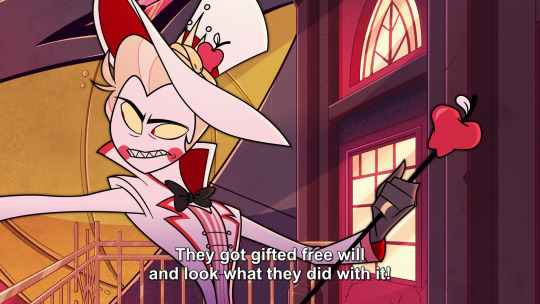
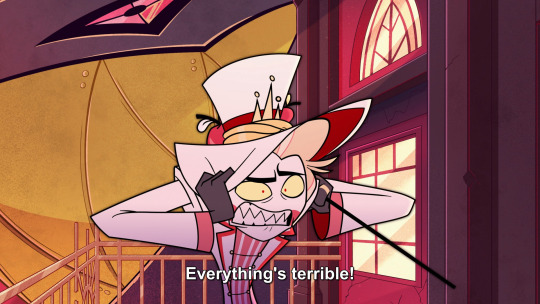
Based on the introduction to Episode 1, Charlie also views 'free will' as a gift (Miltonian), whereas Lucifer appears to view it as a curse.
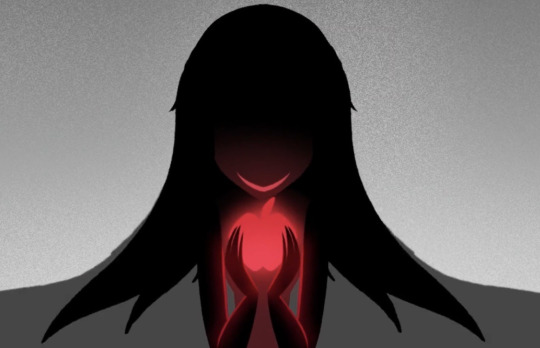
However, Charlie also notes that it was through the 'gift' of free will that the "root of all evil" entered the world, for if mankind could choose to be good, then they could also choose to be evil ('malus').
John Milton states in Paradise Lost: "Of Man's First Disobedience, and the Fruit Of that Forbidden Tree [malus], whose mortal taste Brought Death (evil, malus) into the World, and all our woe."
Thus, the use of an apple specifically is likely a tie-in to what others have been speculating about a character that series creator Vivienne Medrano (Vivziepop) alluded to a while back: "The Root of All Evil".
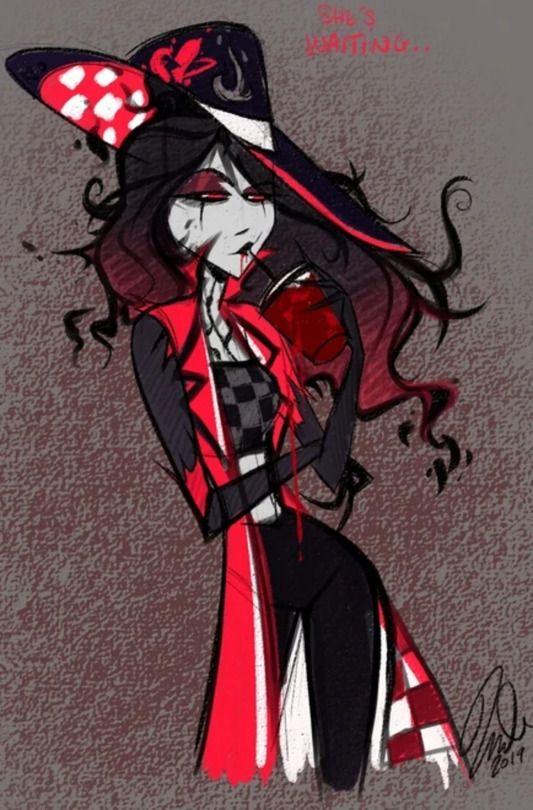
However, "Roo" itself is depicted as possessing the body of a human woman, presumably Eve, the first one to eat the "fruit of knowledge":
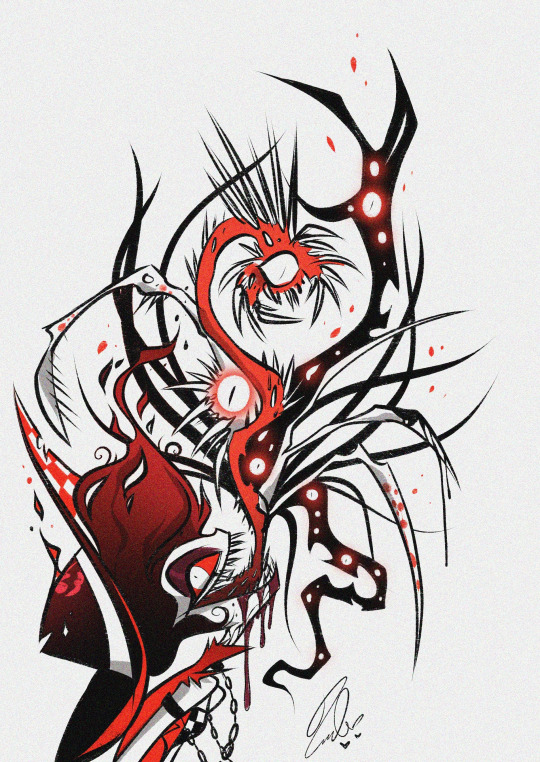
Thus, we can discern that "Malus" likely refers to this character. (Also see: "Maleficent", a name that also uses the root word "mal", "evil".) As for Roo's intentions, if Charlie is "good" - and, if, in fact, Alastor was sent by "Roo" (Eve) - then they may want for Alastor to work on their behalf to "corrupt" Charlie, or make sure the hotel never succeeds.
This is because demonic power is tied to human souls, and there are "millions of souls" in Hell, which likely fuels the great power of "Roo". The more souls there are in Hell, the more powerful "Roo" becomes. The Overlords also get their demonic power from "millions of souls".
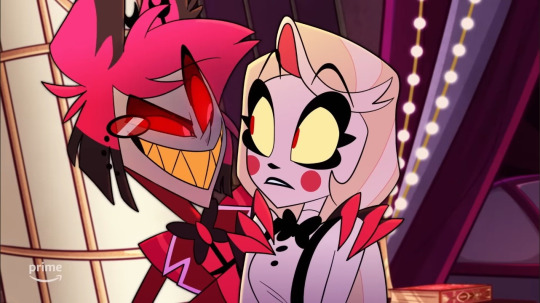
The deal between Eve and "Roo" might even be the first contract, or deal, between a human soul and a demonic entity; in exchange for 'free will', and the knowledge of good and evil, Eve allowed the "Root of All Evil" to inhabit her body, and to escape the void or prison it was confined to by Heaven (Hell?). (For one cannot be 'all-good' unless you attempt to 'eliminate' or 'ablate' evil; and, in Greek mythology, Zeus imprisoned the Titans in Tartarus for all of their evil deeds.)
Another possibility, brought up in an article by Gillian Osborne, is that Lucifer sees the "fruit of knowledge" as an apple, but it may appear as different fruits to different people, depending on how they view it. This also fits with Lucifer and angels being able to easily shapeshift.
In Paradise Lost, only Lucifer describes the fruit as an "apple" (malus), as he associates malus with "bad, evil", while the narrator also describes the fruit as "a mix of different colors" and peach-like. This then begs the question: "Did the fruit of knowledge of good and evil become 'evil' because Eve harbored resentment towards Adam?"
Quote: "Lucifer (Satan) gives Eve yet another hint that this tree may be more complicated than he wishes her to believe: although elsewhere in Milton's poem Eden is heady with its own newness, sprouting spring flowers left and right, the tree of knowledge is already old: its trunk is 'mossie'. Nevertheless, Lucifer claims to wind himself around the tree 'soon'; the quickness of his reported arrival stands in contrast to the timescales required to cover a fruit tree with moss (PL 9.589). Placing Lucifer's winding body between these two timescales—an easeful present and the inhuman scale of natural history—Milton suggests that there is something dangerous in entangling the past with the present. Yet, 'Paradise Lost' also makes deep biblical history feel like present politics for its readers. When Adam and Eve wander out of Eden at the end of the poem, they famously make their way not only into an earthly paradise, but also into the present. Eden's mossy apple tree therefore represents the pitfalls of conflating nature and history, of seeing any action in human history—even Eve's eating of an apple—as natural, if by nature, we mean inevitability. For Milton, history, unlike nature, is directed by humans, progressive, and, like the reading of 'Paradise Lost', hard work. While trees may inevitably collect moss the longer they live, Adam and Eve's labors in the garden, and our labors of reading, require agency and effort. Milton's poem refuses mourning the loss of Eden, [and the perfection of Heaven], in favor of a perpetual, melancholic, recreation of paradise: a present perfecting."
To quote Twisted: The Untold Story of a Royal Vizier, which also draws inspiration from John Milton's Paradise Lost: "It's an unfortunate situation...but you do have a choice [i.e. free will]."
#hazbin hotel#hazbin hotel analysis#hazbin#hazbin analysis#hazbin hotel meta#hazbin meta#hazbin hotel theory#hazbin theory#deep thoughts#john milton#paradise lost#eve hazbin hotel#lucifer hazbin hotel#lucifer morningstar#adam hazbin hotel#lilith hazbin hotel#lilith morningstar#roo hazbin hotel#root of all evil
260 notes
·
View notes
Text

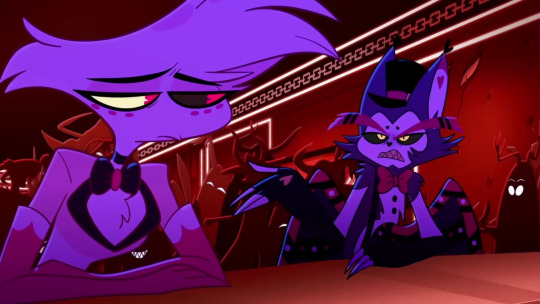
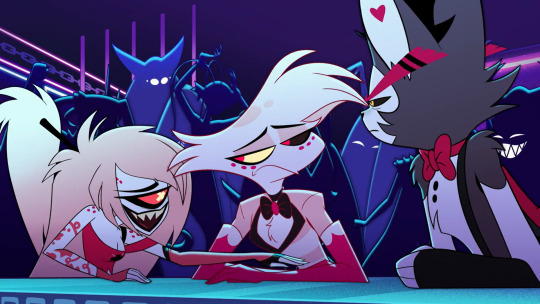
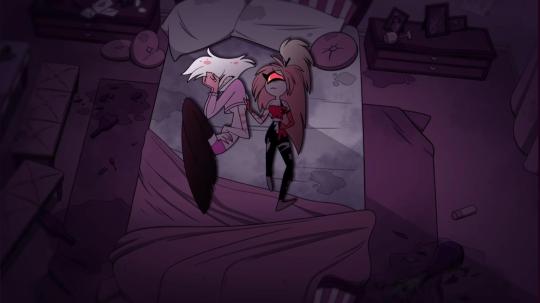
Husk and Cherri Bomb are friends with Angel Dust, but while Cherri has been friends with Angel for a long time and is openly affectionate with him, Husk was formerly cold to Angel and only came to view him as a friend after Angel showed vulnerability and let his walls down around him.
Like Cherri, Husk wants what's best for Angel, but unlike Cherri who thinks that feeding into Angel's addictive tendencies are the best way to treat his depression and that living up to the hotel's standards is only making his life more difficult, Husk encourages Angel to stick with the self-improvement he's learned from the hotel and not fall back into his old ways since Angel's trying to get into Heaven.
"Welcome to Heaven" shows Angel doesn't necessarily have to pick one or the other, as he can still enjoy himself in moderation so long as he still prioritizes being a good person, Angel saying there's room for both Cherri and Husk as his friends.
#hazbin hotel#vivziepop#hazbin analysis#character analysis#angel dust#husker hazbin hotel#hazbin huskerdust#huskerdust#cherridust#cherri bomb#cherri hazbin hotel#hazbin hotel cherri bomb#angel dust hazbin hotel#hazbin hotel angel dust#hazbin hotel anthony#hazbin hotel husker#husker#angel dust and husk#husk and angel dust#welcome to heaven
785 notes
·
View notes
Text
In the hobbit, Bilbo nearly kills Gollum in the goblin tunnels, but pity stayed his hand.
So instead of putting the long suffering creature out of its misery, Bilbo spares Gollum’s life, which on one hand can be seen as an act of mercy and courage, but ultimately has bad repercussions. (ie. Gollum telling Sauron where to find the ring of power)



Sound familiar?
#Charlie says sinners make mistakes#Vaggie’s mistake was hesitating and acting based on emotion#and I know that sounds harsh but remember#sinners are already dead#the exterminations basically put them out of their misery#analysis#hazbin hotel#hazbin hotel critical#hazbin hotel critique#hazbin hotel criticism#vaggie hazbin hotel#hazbin vaggie#vaggie#hazbin hotel vaggie#exorcist vaggie#the hobbit#lotr#the lord of the rings#lord of the rings#hazbin hotel analysis#hazbin analysis#my stuff
23 notes
·
View notes
Text
Episode 4 of Hazbin is quite literally the best episode so far. It doesn't suffer from the vivzieisms that the first three episodes did and fundamentally told a better story about an SA and abuse survivor than I've seen in a long time, speaking from being an SA survivor. Angel being an unperfect and sometimes downright awful person with how he acts around people is really important to portray. When people always see perfect victims, they then like to dismiss victims who are assholes. NEWSFLASH!!! Many victims suffer negatively to their social skills when they are being abused!
Especially with Angel's hypersexual demeanor to everyone, I find it so refreshing how he even sees the need to be desired by everyone as crucial while also hoping that they reject him the same time. He feels the need to be the person that he pretends to be in all his videos because then he is desired by people; wanted. But he hates being Valentino's favorite toy. He needs to be wanted, but hates hates the biggest source of it, since it is the source of his abuse.
#hazbin#hazbin hotel#angel dust#helluva boss#hazbin meta#hazbin hotel angel dust#hazbin hotel meta#hazbin analysis#hazbin hotel analysis#character analysis#angel dust analysis#vivziepop#vivzieverse
205 notes
·
View notes
Text
After rewatching the second episode a couple more times, I think there might be something pretty interesting going on with the dynamics between the three V’s.
See, in his big song number Alastor insinuates that Vox only got to where he is because of Valentino and Velvette, and that he actually depends on the other two FAR more than he’d like to admit. An insinuation that clearly hits WAY too close to home for Vox.
But what’s interesting is that the episode ALSO shows the REVERSE to be true as well. Specifically in how it shows Vox needing to manage Valentino when he throws his big temper tantrum and talk him down before he goes and picks a fight with someone who could probably squash him like a bug.
So what’s really going on here?
Well, contrary to any one-sided, exploitative, ‘you need me more than I need you’ relationship we might have expected, I think all three of the V’s actually NEED the other two FAR more than they’d like to admit. It’s only thanks to the three of them teaming up that they’ve gotten as far as they have, and the power base they have now depends on the mutual support they give each other. Whether it’s Vox needing Valentino and Velvette to really market his products or Valentino needing Vox and Velvette to manage his tantrums or likely any number of other things.
Of course, because all three of them have bought fully into the cynical ‘depending on others is a weakness’, ‘friendship is for losers’ and ‘I’m a strong, independent overlord who don’t need no friends’ narrative, NONE of them are willing to admit or possibly even recognize just how much they all really need each other.
Which of course plays perfectly in the show’s themes of ‘love and friendship are cool and also necessary actually’ and makes the trio a perfect foil and even example of what Charlie is striving for. And gives a good indicator of how the V’s will be ‘defeated’ as villains. Not due to anything the heroes might do specifically, but rather brought down by their own personal hang-ups. Because I imagine that if just one of the V’s decided one day that they didn’t need the other two and tried to strike out on their own, all three of them would lose EVERYTHING.
#hazbin hotel#hazbin spoilers#hazbin hotel spoilers#earlyaccesshh#hazbin vox#hazbin valentino#hazbin velvette#hazbin analysis#hazbin theory
191 notes
·
View notes